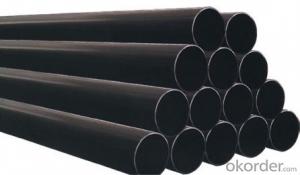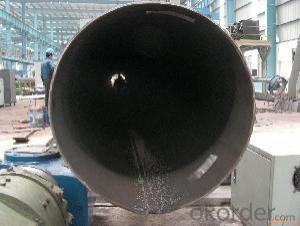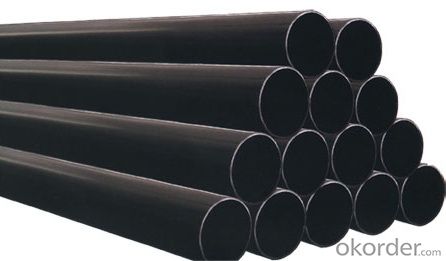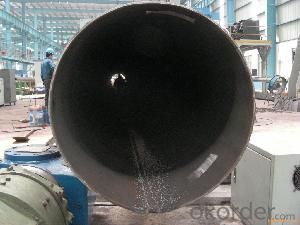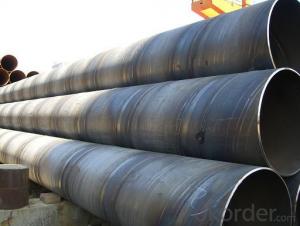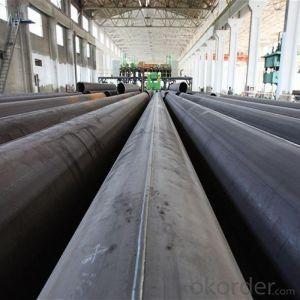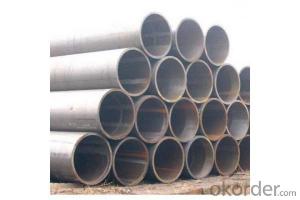API SSAW LSAW CARBON STEEL PIPE LINE OIL GAS PIPE 56''
- Loading Port:
- Tianjin
- Payment Terms:
- TT OR LC
- Min Order Qty:
- 5 m.t.
- Supply Capability:
- 3000 m.t./month
OKorder Service Pledge
OKorder Financial Service
You Might Also Like
Packaging & Delivery
Packaging Detail: | standard export packing or as customer's requirement |
Delivery Detail: | within 10 - 30 days |
Specifications
Spiral Welded Steel Pipes and Tubes
1.Material:Q195-Q235
2.Length:1-12m
3.WT:1.0-14mm
4.O.D.:20-273mm
Spiral Welded Steel Pipes and Tubes
Product Description:
1.Material : Q235,Q345,L245,L290,L360,L415,L450,L485,GrB,X42,46,X52,X56,X60,X65,X70,X80,X100
2,Standard: SY/T5037-2000,GB/T9711-2011,API Spec 5L PSL1/PSL2,ASTM A252\A53,ISO3183,DIN17172,EN10217,JIS G3457,AWWA C200,ASTM A139,ASTM A671,ASTM A672
3.Wall thickness: 3.0mm-30mm
4.Outer diameter: φ168mm-3020mm
5,Length: 5m-12m or as your requirement
6,Corrosion protection standard: DIN30670,DIN30671, AWWAC210, AWWA C203, SY/T0413-2002,SY/T0414-2002
7,Application: Oil, gas, natural gas, water pipe, thermal electricity pipe, steel structure engineering, etc
Q195-q345 Material Steel Pipe's Materials
Elements | Chemical Compsition% | Mechanical Property | ||||||
C% | Mn% | S% | P% | Si% | Yield Point (Mpa) | Tensile Strength(Mpa) | Elongation | |
Q195 | 0.06-0.12 | 0.25-0.50 | <0.050< span=""> | <0.045< span=""> | <0.030< span=""> | >195 | 315-430 | 32-33 |
Q215 | 0.09-0.15 | 0.25-0.55 | <0.05< span=""> | <0.045< span=""> | <0.030< span=""> | >215 | 335-450 | 26-31 |
Q235 | 0.12-0.20 | 0.30-0.70 | <0.045< span=""> | <0.045< span=""> | <0.030< span=""> | >235 | 375-500 | 24-26 |
Q345 | <0.20< span=""> | 1.0-1.6 | <0.040< span=""> | <0.040< span=""> | <0.55< span=""> | >345 | 470-630 | 21-22 |
Packaging & Delivery
Packaging Detail: | Normal exporting packing,in container or bulk vessel or as per clients' request |
Delivery Detail: | 2 months after confimed contract |
Specifications
Large Diameter API 5L X70 PSL2 LSAW Steel Pipe
Grade: X42, X46, X50, X52, X60, B, C
OD: 1.5"-28"
WT: SCH10-SCH160
Large Diameter API 5L X70 PSL2 LSAW Steel Pipe
Specifications:
u Standard: API 5L
u Grade: B, C, X42, X46, X50, X52, X56, X60, X65, X70, X80
u OD: 1.5"-28"
u WT: SCH10-SCH160
u Length: 5-12m
u Ends Finish: plain end, bevel end, grooved end
u Surface Treatment: bare, black varnished, oiled finish, red color, anti-corrosion, 3PE, FBE or epoxy coating
u Technique: hot rolled or cold drawn
u Application: api 5l steel pipe for conveying oil, water, gas
u Invoicing: based on theoretical weight or actual weight
u Payment Terms: L/C at sight, T/T or Western Union
u Trade Terms: FOB, CFR, CIF
u Certification: ABS manufacturing assessment, ABS design assessment, API 5CT, API 5L, DNV manufacturer certificate, ISO9001 quality management system certificate, ISO14001 environment management system certificate, GB/T28001 occupational health and safety management system certificate, A1 class manufacturing license of special equipment certificate, CCS, GL, LR, SGS, TüV, PDE
- Q: Can steel pipes be used for oil and gas well production?
- Yes, steel pipes can be used for oil and gas well production. Steel pipes are commonly used in the oil and gas industry due to their high strength and durability, which allows them to withstand the harsh conditions of drilling and production processes. Additionally, steel pipes can efficiently transport oil and gas over long distances, making them a preferred choice in the industry.
- Q: Can galvanized steel tubes simmer?
- I make the steel pipe, galvanized pipe and water conveying pipe material is the same, can be bent, specific to what to look at the furnace, can refer to a single material
- Q: Are steel pipes suitable for underground drainage systems?
- Yes, steel pipes are suitable for underground drainage systems. Steel pipes have several qualities that make them a popular choice for underground drainage. Firstly, steel pipes are strong and durable, capable of withstanding high pressure and heavy loads. They are resistant to corrosion and can last for many years without the need for frequent maintenance or replacement. Steel pipes also have the advantage of being versatile and adaptable to different soil conditions. They can be easily customized to fit the specific needs of the drainage system, including varying diameters and lengths. Additionally, steel pipes can be welded together, ensuring a tight and secure connection that prevents leakage and the infiltration of groundwater. Another benefit of steel pipes in underground drainage systems is their ability to handle a wide range of temperatures. They are resistant to extreme heat or cold, making them suitable for various climates and environments. However, it is important to note that steel pipes can be more expensive than alternative materials like PVC or HDPE pipes. Additionally, they can be heavier and more difficult to install, requiring specialized equipment and expertise. Overall, steel pipes are a reliable and long-lasting option for underground drainage systems, particularly in areas where durability and strength are important considerations.
- Q: What is the role of steel pipes in sewage systems?
- Steel pipes are commonly used in sewage systems as they provide durability, strength, and resistance to corrosion. They serve the crucial role of transporting wastewater, sewage, and other fluids from buildings to treatment facilities or disposal sites. Steel pipes are able to withstand the high pressure and gravity flow of sewage, ensuring the safe and efficient conveyance of waste materials.
- Q: Are steel pipes suitable for potable water applications?
- Yes, steel pipes are suitable for potable water applications. Steel pipes are commonly used for transporting water in various industries and municipal water systems. They are known for their durability, strength, and resistance to corrosion, making them a reliable choice for potable water systems. Steel pipes also have the advantage of being able to withstand high pressure and temperature conditions, making them suitable for both hot and cold water applications. Additionally, steel pipes can be easily welded, ensuring leak-free connections. However, it is important to note that the quality of the steel used and proper maintenance are crucial factors in ensuring the safety and suitability of steel pipes for potable water applications. Regular inspection and maintenance should be done to prevent corrosion and ensure the integrity of the pipes.
- Q: What are the disadvantages of using steel pipes?
- One disadvantage of using steel pipes is that they are prone to corrosion, especially in environments with high humidity or exposure to certain chemicals. This can lead to structural damage and reduced lifespan of the pipes. Additionally, steel pipes are relatively heavy and bulky, making transportation and installation more challenging compared to other pipe materials. Lastly, steel pipes can be more expensive than alternative materials, which can impact project budgets.
- Q: What are the different standards for steel pipes?
- There are several different standards for steel pipes, including ASTM (American Society for Testing and Materials), API (American Petroleum Institute), and ASME (American Society of Mechanical Engineers). These standards specify the requirements for various aspects of steel pipes, such as their dimensions, chemical composition, mechanical properties, and testing procedures. These standards ensure that steel pipes meet the necessary quality and safety standards for their intended applications.
- Q: What is the thickness of steel pipes?
- The thickness of steel pipes can vary depending on the specific application and industry requirements. However, typical steel pipes used in various industries, such as construction and oil and gas, can have thicknesses ranging from a few millimeters to several centimeters.
- Q: How do steel pipes handle seismic activities?
- Steel pipes are designed to have high ductility and strength, allowing them to handle seismic activities effectively. The flexibility of steel pipes allows them to absorb and distribute the energy generated during an earthquake, minimizing the risk of structural damage and ensuring the safety of the infrastructure. Additionally, steel pipes can be reinforced with various techniques, such as braces or rubber isolators, to further enhance their seismic resistance.
- Q: What is the role of steel pipes in the construction of bridges?
- Steel pipes play a vital role in the construction of bridges as they are used for various purposes such as providing structural support, carrying water or gas, and facilitating the transportation of electrical and communication cables. Their strength, durability, and ability to withstand heavy loads make them an essential component in bridge construction, ensuring the stability and longevity of the structure.
Send your message to us
API SSAW LSAW CARBON STEEL PIPE LINE OIL GAS PIPE 56''
- Loading Port:
- Tianjin
- Payment Terms:
- TT OR LC
- Min Order Qty:
- 5 m.t.
- Supply Capability:
- 3000 m.t./month
OKorder Service Pledge
OKorder Financial Service
Similar products
Hot products
Hot Searches
Related keywords
